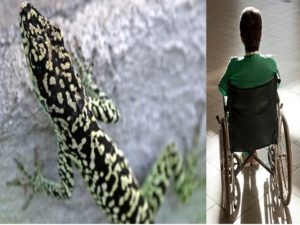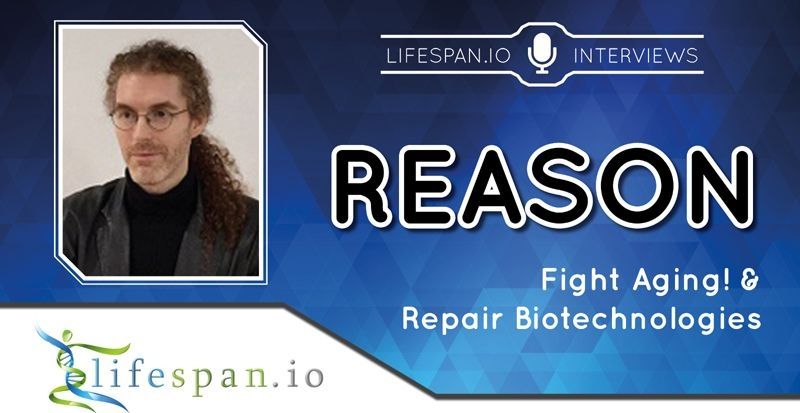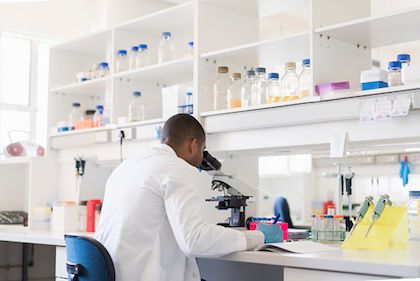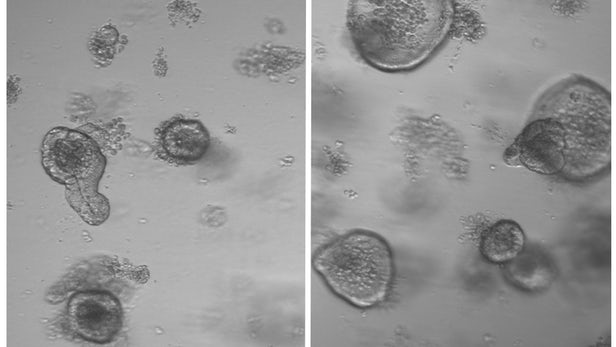
Category: life extension – Page 588



Reason – Fight Aging! blog and Repair Biotechnologies
An interview on rejuvenation science, advocacy, and more with Reason from the blog Fight Aging!.
Most people interested in rejuvenation and life extension are familiar with Fight Aging!, one of the very first rejuvenation advocacy blogs dating back all the way to the early 2000s; if you’re one of them, then you certainly are familiar with Reason, the man behind FA!.
Over the years, Reason has been a patient yet relentless advocate, acting not only as an information provider for the public but also helping out innumerable organizations and companies in the field of rejuvenation biotechnology in financial and other ways. Back in the day when SRF didn’t exist yet, Reason was a volunteer for Methuselah Foundation; eventually, he helped fund companies such as Oisìn Biotechnologies, CellAge, and LysoCLEAR; and, earlier this month, Reason and Bill Cherman co-founded Repair Biotechnologies, a company focused on gene therapy for rejuvenation, as announced on FA!.
Bill Cherman is an investor in the rejuvenation community who, just like Reason, has contributed to development of many ventures in the field. He is a holder of a gold medal in the Brazilian Mathematics Olympiad, a BA in economics, and a candidate in the Master of Biotechnology Enterprise and Entrepreneurship program at Johns Hopkins. He founded Front Seat Capital, a venture capital firm looking to invest in startups with the potential to change the world.

Anti-aging protein alpha Klotho’s molecular structure revealed
DALLAS – March 29, 2018 – Researchers from UT Southwestern’s Charles and Jane Pak Center for Mineral Metabolism and Clinical Research and Internal Medicine’s Division of Nephrology recently published work in Nature that reveals the molecular structure of the so-called “anti-aging” protein alpha Klotho (a-Klotho) and how it transmits a hormonal signal that controls a variety of biologic processes. The investigation was performed in collaboration with scientists from New York University School of Medicine and Wenzhou Medical University in China.
Studies at UTSW two decades ago by Dr. Makoto Kuro-o, Professor of Pathology, demonstrated that mice lacking either a-Klotho or the hormone FGF23 suffered from premature and multiple organ failure as well as other conditions, including early onset cardiovascular disease, cancer, and cognitive decline. Because defects in a-Klotho lead to symptoms seen in aging, researchers inferred that a-Klotho suppresses aging, leading to great interest in how the a-Klotho protein might work together with the hormone FGF23 to fulfill their roles.
A-Klotho can exist on the surface of a cell or can be released from the cell and circulate in body fluids, including the blood, as soluble a-Klotho. The cell-attached form and the circulating form of a-Klotho were previously and universally believed to serve completely different functions.
Scientists discover promising off-switch for inflammation
And inflammation is one of the three primary ageing processes.
Scientists have discovered a new metabolic process in the body that can switch off inflammation. They have discovered that ‘itaconate’—a molecule derived from glucose—acts as a powerful off-switch for macrophages, which are the cells in the immune system that lie at the heart of many inflammatory diseases including arthritis, inflammatory bowel disease and heart disease.
The scientists, working in the School of Biochemistry and Immunology in the Trinity Biomedical Sciences Institute at Trinity College Dublin, hope their discovery will have relevance for inflammatory and infectious diseases—and that their findings may also help to develop much-needed new drugs to treat people living with these conditions.
Professor of Biochemistry at Trinity, Luke O’Neill, was, along with Dr. Mike Murphy of the University of Cambridge, the joint leader of the work just published in leading international journal Nature. The discoveries were made using both human cells and mice as a model organism.

Chronic Supplementation With a Mitochondrial Antioxidant (MitoQ) Improves Vascular Function in Healthy Older AdultsNovelty and Significance
The researchers found that when taking the supplement, dilation of subjects’ arteries improved by 42 percent, making their blood vessels, at least by that measure, look like those of someone 15 to 20 years younger.
Excess reactive oxygen species production by mitochondria is a key mechanism of age-related vascular dysfunction. Our laboratory has shown that supplementation with the mitochondrial-targeted antioxidant MitoQ improves vascular endothelial function by reducing mitochondrial reactive oxygen species and ameliorates arterial stiffening in old mice, but the effects in humans are unknown. Here, we sought to translate our preclinical findings to humans and determine the safety and efficacy of MitoQ. Twenty healthy older adults (60–79 years) with impaired endothelial function (brachial artery flow–mediated dilation 6%) underwent 6 weeks of oral supplementation with MitoQ (20 mg/d) or placebo in a randomized, placebo-controlled, double-blind, crossover design study.

Mark O’Connell: five books to understand transhumanism
As humans, we are defined by, among other things, our desire to transcend our humanity. Mythology, religion, fiction and science offer different versions of this dream. Transhumanism – a social movement predicated on the belief that we can and should leave behind our biological condition by merging with technology – is a kind of feverish amalgamation of all four. Though it’s oriented toward the future, and is fuelled by excitable speculation about the implications of the latest science and technology, its roots can be glimpsed in ancient stories like that of the Sumerian king Gilgamesh and his quest for immortality.
Will humans ever conquer mortality by merging with technology? The 2018 Wellcome prize winner shares his favourite books on transhumanism, from a cyborg manifesto to a Don DeLillo novel.
La conquista de la muerte
This week RT en Español aired a half hour show on life extension and #transhumanism on TV to millions of its #Spanish viewers. My #ImmortalityBus and work was covered. Various Lifeboat Foundation members in this video: Give it a watch:
La longevidad, la inmortalidad… Temas que nunca han dejado a nadie indiferente. Ahora algunos científicos aseguran que la inmortalidad es técnicamente alcanzable en un futuro cercano. Pero al mismo tiempo surgen preguntas de carácter moral e incluso filosófico: ¿qué significa alcanzar la inmortalidad para cada uno de nosotros? Además, en una sociedad consumista y de empresas transnacionales como la nuestra, suena poco convincente que la inmortalidad pueda llegar a ser accesible para todos.
Suscríbete a nuestro canal de eventos en vivo:
RT en Twitter: https://twitter.com/ActualidadRT
RT en Facebook: https://www.facebook.com/ActualidadRT
RT en Google+: https://plus.google.com/+RTenEspanol/posts
RT en Vkontakte: http://vk.com/actualidadrt
Vea nuestra señal en vivo: http://actualidad.rt.com/en_vivo

On life extension and risk aversion
A discussion on whether or not extended lifespans might make us paranoid about every tiniest risk.
Some months back, I read “Sapiens: A Brief History of Humankind” by Yuval Noah Harari. It’s a really good book, though it did disappoint me significantly when, after discussing the past and the present of our species, the author began glancing towards possible futures. At that point, the impartiality required of a historian, which Harari had thus far managed to keep up more or less evenly throughout the book, gave way to a subtly implied pessimism pervading, among other things, his views on future rejuvenation biotechnology.
Honestly, I wasn’t expecting him to even touch upon the subject; I was pleasantly surprised, at least until I realized that his concerns, most of which were the usual ones you’d expect, seemed to make him inclined to see rejuvenation as a plague rather than a blessing.
A curious new concern
Harari presented his concerns but didn’t venture imagining any solutions to them, which I find to be a fatal flaw that pushes readers to assume that they are insolvable and inescapably destined to materialize, and neither of these things is necessarily true.

Future anti-aging drugs could flip a “metabolic switch” to mimic fasting
Fasting has been found to have a range of health benefits, and appears to slow down the aging process. Now, researchers from MIT have found that fasting for just 24 hours is enough to improve the regeneration of a person’s intestinal stem cells, which naturally declines with age. Better yet, with the metabolic switch identified, in the future the effect could be mimicked with a drug.
As with stem cells in all parts of the body, intestinal stem cells are in charge of growing new cells in the organ. They maintain the lining of the intestine, which is shed and replaced every few days, fight off infection and repair damage to the tissue. But as is usually the case, these stem cells get less and less effective at their job with age.
Previous research has found that caloric restriction, or continual fasting, has a profound effect on health and longevity. These effects have been seen in mice, rats, monkeys, lemurs, and other animals, and although human studies haven’t really been conducted, it seems that we could also benefit from harnessing the diet. So the MIT team set out to study the effects of fasting on intestinal stem cells.